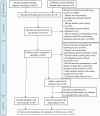Do People With Schizophrenia Enjoy Social Activities as Much as Everyone Else? A Meta-analysis of Consummatory Social Pleasure
- PMID: 36820515
- PMCID: PMC10154728
- DOI: 10.1093/schbul/sbac199
Do People With Schizophrenia Enjoy Social Activities as Much as Everyone Else? A Meta-analysis of Consummatory Social Pleasure
Abstract
Background: The "emotion paradox" of schizophrenia suggests people with schizophrenia demonstrate deficits when reporting anticipated and retrospective pleasure; yet, in-the-moment, consummatory pleasure is largely intact. It is uncertain how these findings extend to social situations. This meta-analysis aimed to (1) determine the mean difference in consummatory social pleasure between people with schizophrenia and healthy controls, and (2) examine moderators of this effect, including study design and clinical characteristics of participants.
Design: A literature search using PsycINFO, Web of Science, Pubmed, and EMBASE databases was conducted. Studies measuring consummatory social pleasure using experience sampling methods and laboratory social simulations were included. Random effects meta-analyses were conducted using Hedge's g.
Results: Meta-analysis of 26 studies suggests people with schizophrenia exhibited a small, significant deficit in consummatory social pleasure (g = -0.38, 90% CI [-0.53, -0.22]). There was significant heterogeneity in effect sizes; magnitude was moderated by study design and type of measure used to assess social pleasure.
Conclusions: Overall, people with schizophrenia seem to exhibit less consummatory social pleasure than controls. However, this deficit is smaller than in studies of anticipated and retrospective pleasure. Thus, consummatory social pleasure may not be quite as impaired in people with schizophrenia as traditional anhedonia research suggests. Moreover, pleasure deficits observed in people with schizophrenia may result from differences in the quality of their daily social experiences rather than differences in their capacity for social pleasure. Results have important implications for clinical interventions that address barriers to social engagement, low-pleasure beliefs, and cognitive remediation to treat schizophrenia.
Keywords: emotion paradox of schizophrenia; experience sampling methods; psychotic disorders; social anhedonia; social functioning.
© The Author(s) 2023. Published by Oxford University Press on behalf of the Maryland Psychiatric Research Center. All rights reserved. For permissions, please email: journals.permissions@oup.com.
Figures
References
Publication types
MeSH terms
Grants and funding
LinkOut - more resources
Full Text Sources
Medical



